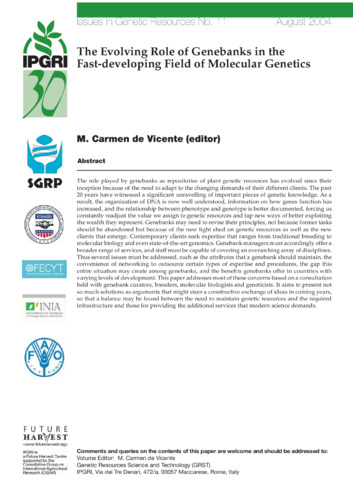The evolving role of genebanks in the fast-developing field of molecular genetics
The role played by genebanks as repositories of plant genetic resources has evolved since their inception because of the need to adapt to the changing demands of their different clients. The past 20 years have witnessed a significant unravelling of important pieces of genetic knowledge. As a result, the organization of DNA is now well understood, information on how genes function has increased, and the relationship between phenotype and genotype is better documented, forcing us constantly readjust the value we assign to genetic resources and tap new ways of better exploiting the wealth they represent. Genebanks may need to revise their principles, not because former tasks should be abandoned but because of the new light shed on genetic resources as well as the new clients that emerge. Contemporary clients seek expertise that ranges from traditional breeding to molecular biology and even state-of-the-art genomics. Genebank managers must accordingly offer a broader range of services, and staff must be capable of covering an overarching array of disciplines. Thus several issues must be addressed, such as the attributes that a genebank should maintain, the convenience of networking to outsource certain types of expertise and procedures, the gap this entire situation may create among genebanks, and the benefi ts genebanks offer in countries with varying levels of development. This paper addresses most of these concerns based on a consultation held with genebank curators, breeders, molecular biologists and geneticists. It aims to present not so much solutions as arguments that might steer a constructive exchange of ideas in coming years, so that a balance may be found between the need to maintain genetic resources and the required infrastructure and those for providing the additional services that modern science demands.

